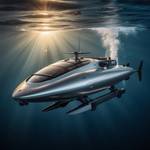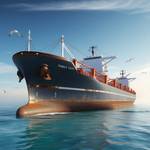Sonar
Sonar is a technique that uses sound to navigate, communicate with or detect other vessels, and to observe the distance and velocity of underwater objects. The acoustic frequencies used vary from extremely low (infrasonic) to very high (ultrasonic). The word “sonar” also describes the equipment used to gather and analyze acoustic information. Sonar is used in depth sounding, fish finding, seafloor mapping, Doppler navigation, and acoustic location systems for divers. The term for the scientific study of underwater sound is hydroacoustics.
Three types of technology are categorized as "sonar":
- Passive sonar uses receiving sensors to listen for and analyze the sound made by vessels
- Active sonar uses an acoustic projector to emit pulses of sounds and a receiver which detects the echoes to find the range, bearing and relative motion
- Acoustic communication systems use a projector and receiver at both ends of the acoustic path
Sonar was first proposed as a means of detecting icebergs, but government interest in and funding of sonar systems did not take off until World War I highlighted the threat posed by submarine warfare. Modern technological innovations have included rapid-scanning and side-scan sonar, the echo sounder (or depth detector,) and within-pulse electronic sector scanning sonar (or WPESS). Military uses of sonar include systems used in acoustic homing torpedoes, in acoustic mines and mine detection.

Massa Products Corporation: Innovating Sonar Technology & Securing the Future of the Maritime Workforce
Dawn Massa Stancavish, President, CEO, and Chief Innovation Officer, Massa Products Corporation…

First Dutch Navy Mine Countermeasure Vessel Starts Sea Trials
The Vlissingen, the second of the series of mine countermeasures vessels (MCM) of…

Fascinated by Shipwrecks Podcast: Episode 8 – Vince Capone
The Fascinated by Shipwrecks Podcast, hosted by Kathy A. Smith, is dedicated to…

Obituary: Karl Kenny, Founder, Kraken Robotics
Kraken Robotics Inc. announced the passing of founder and former CEO, Karl Kenny on February 11…

Great Ship of 2024: CSD Vaneta Marie
Muddy Water Dredging’s new cutter suction dredge (CSD) Vaneta Marie “represents the…

Swedish, U.S. Marines Team @ Exercise Archipelago Endeavor 2024
Swedish and U.S. Marines gathered in Sweden’s rocky coastal archipelago to improve…

Moose Boats to Build Patrol Boat for Sacramento County
The Sacramento County Sheriff’s Marine Enforcement Detail has selected Moose Boats to build a new…

Billions in Lost Treasure: How Modern Technology Is Revealing Hidden Riches from the Depths!
Oceans worldwide hold untold riches hidden beneath the waves. Now treasure hunters…

Bayesian Yacht Disaster: How Specialist Search and Rescue Teams Work Underwater
Search and rescue for missing persons is always challenging for the specialist recovery…

Greensea IQ Contract to Further Develop USN Autonomous Vehicle
Greensea IQ announced an extension to its prototype (Other Transaction Agreement)…

New Fireboat Delivered to Cape Coral Fire Department
Theodore, Ala. boatbuilder Silver Ships said it has recently delivered a newly built…

UUV Integration Will Transform Submarine Tactics
For decades, submarines have been the apex predator, roaming the oceans largely unmolested…

The maritime industry is on the brink of a revolution, with autonomous and unmanned marine vehicles poised to redefine the future of shipping. These innovative vessels, powered by advanced technologies and cutting-edge propulsion systems, offer numerous advantages, including increased efficiency, reduced operational costs, and enhanced safety. In this article, we'll explore the current state of autonomous marine vehicles, their propulsion systems, and the potential impact they may have on the global shipping industry.
Pods are devices which combine both propulsive and steering functions in one device. They are usually located below the stern of a ship, making use of the following internal components: a fix pitch propeller, shaft, thrust and support bearings…

Container ships are vessels designed specifically to transport standardized containers. Container ships have revolutionized shipping, making it more cost-effective and efficient to transport goods across oceans.
A ship simulator is an advanced training device; an electronic or mechanical system used to expose vessel operators and crew members to typical shipboard conditions and systems. Simulation training is not a substitute for the experience of training on an actual vessel…

Tanker ships are an important component of the maritime sector, and they transport liquid cargoes around the world. These vessels are vital to the supply chain for energy, chemicals and other essential commodities. There are many types of tankers, each designed for specific cargoes such as oil, LNG, chemicals, or other liquids.






















